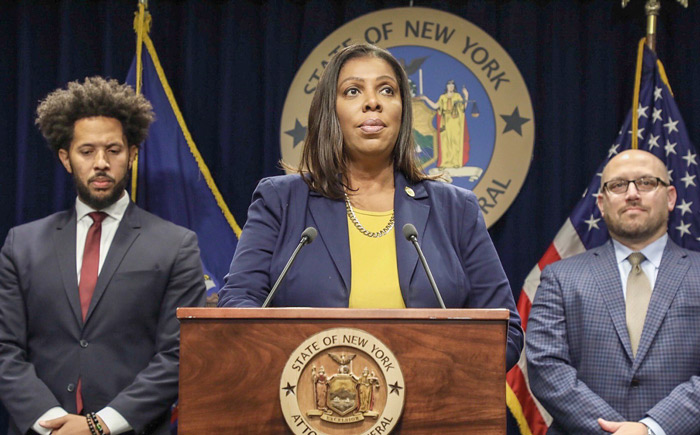Photo Courtesy of the Office of the State Attorney General
New York AG Tish James
By Forum Staff
A coalition of nearly two-dozen chief law enforcement officers has reached out to the Federal Trade Commission urging the agency to adopt regulations to prevent consumers from being deceived by negative-option marketing schemes, State Attorney General Tish James, co-leader of the allied group, announced Tuesday.
According to the coalition of 23 attorneys general, with negative-option marketing, a marketer presents consumers with an offer and the consumers’ silence or failure to take action in response to that offer is deemed acceptance or approval of the offer. One especially problematic type of a negative-option offer involves a so-called “free” trial, in which consumers are offered a trial period of a product or service gratis. To receive the free trial, consumers are required to submit their credit or debit card number. However, the free trial has additional terms and conditions—which, according to the coalition, are not clearly or conspicuously disclosed to the consumer—stating that unless consumers cancel the goods or services they are agreeing to continue to receive and pay for them. Companies are not required to remind consumers before their free trials end, which could result in some consumers being charged automatically once the free trial is over.
“Significant problems continue in any type of marketing where a consumer’s silence is deemed to be acceptance, thereby upsetting the common expectation that a consumer is not bound until there is a mutual agreement—in effect a handshake where each party affirmatively accepts the material terms of the agreement,” the AGs wrote. “This is not what happens in negative-option marketing in which consumers often find themselves in a sales plan where they are being billed and called upon to pay for products and services; and the circumstances fail to show that material terms were clearly and conspicuously disclosed or affirmatively agreed upon. Further, when consumers seek to extricate themselves from these plans, they often run into multiple roadblocks in effectuating a cancellation and obtaining a refund of monies paid.”
In a 13-page letter to the FTC, the coalition argues for the commission to use its rulemaking authority to further expand existing negative-option regulations which were adopted in 1973 and regulate only one type of negative-option marketing—the delivery of merchandise where consumers receive periodic announcements that merchandise will be delivered unless they decline within a set time frame (i.e. book-of-the-month clubs).
In the missive, the attorneys general argue that expansion of regulations would achieve the following:
Informed Consent: In addition to consenting to any trial offer, sellers should have to obtain a separate consent to charge for goods or services after the trial period has ended.
Periodic Notices: Sellers should be required to send regular notifications to consumers enrolled in negative option plans that disclose the timing, amount, and method by which the seller bills the consumer for the renewal, and that provides the consumer with a convenient method to cancel the goods or services.
Define Simple Cancellation Processes: Consumers should be allowed to cancel their memberships using the same method they used to enroll in a program.
Refunds: Consumers who are unwittingly enrolled in negative option plans should be entitled to a refund from the date the free trial ended and their enrollment began to be charged.

